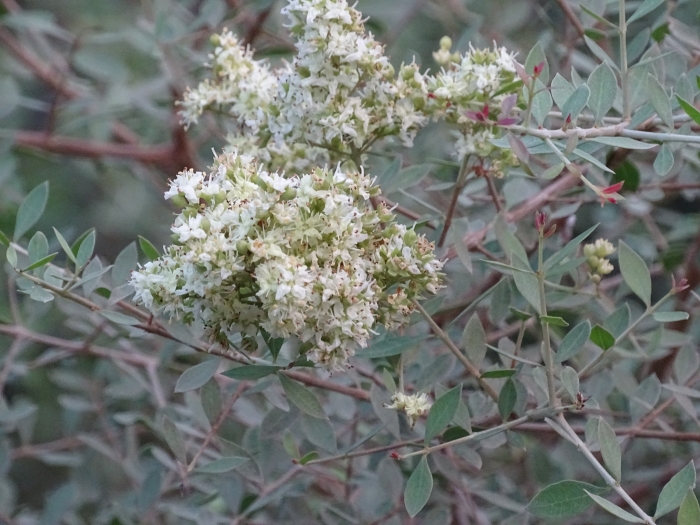Henna Tree
(Lawsonia inermis)
Henna Tree (Lawsonia inermis)
/
/

Jacky Judas
CC BY 4.0
Image By:
Jacky Judas
Recorded By:
Copyright:
CC BY 4.0
Copyright Notice:
Photo by: Jacky Judas | License Type: CC BY 4.0 | License URL: http://creativecommons.org/licenses/by/4.0/ | Rights Holder: Jacky Judas | Publisher: iNaturalist | Date Created: 2019-07-03T06:50:52-07:00 |














































Estimated Native Range
Summary
Lawsonia inermis, commonly known as Henna Tree, is an evergreen shrub or small tree native to semi-arid regions, tropical savannas, and scrublands of North Africa, the Middle East, and South Asia. It typically grows to a height of 1.8 to 7.6 meters (6 to 25 feet) with a spread of 2 to 4 meters (6.5 to 13 feet). The plant has multiple stems and fine branches, with bark that is smooth and grayish-brown. The leaves are opposite, entire, glabrous, and have a distinctive lanceolate shape. Henna Tree is renowned for its small, fragrant white or pink flowers that bloom in large clusters, primarily during the summer months. The flowers are showy due to their abundance and sweet scent. After flowering, it produces small, dry brown fruits.
The Henna Tree is valued for its ornamental features, including its fragrant flowers and attractive foliage. It is used in landscapes as a hedge or a free-standing specimen. The leaves contain lawsone, a dye that has been used for centuries to color skin, hair, fingernails, leather, silk, and wool. In cultivation, it requires a warm climate and does not tolerate frost. It thrives in full sun and can tolerate drought once established, making it suitable for xeriscaping. It prefers well-drained soils but can adapt to different soil types. The Henna Tree is relatively low maintenance but can be susceptible to root rot in overly wet conditions. It is also prone to pests such as aphids and spider mites.CC BY-SA 4.0
The Henna Tree is valued for its ornamental features, including its fragrant flowers and attractive foliage. It is used in landscapes as a hedge or a free-standing specimen. The leaves contain lawsone, a dye that has been used for centuries to color skin, hair, fingernails, leather, silk, and wool. In cultivation, it requires a warm climate and does not tolerate frost. It thrives in full sun and can tolerate drought once established, making it suitable for xeriscaping. It prefers well-drained soils but can adapt to different soil types. The Henna Tree is relatively low maintenance but can be susceptible to root rot in overly wet conditions. It is also prone to pests such as aphids and spider mites.CC BY-SA 4.0
Plant Description
- Plant Type: Tree, Shrub
- Height: 18-24 feet
- Width: 12-18 feet
- Growth Rate: Moderate
- Flower Color: White
- Flowering Season: Spring, Summer, Fall
- Leaf Retention: Evergreen
Growth Requirements
- Sun: Full Sun
- Water: Medium
- Drainage: Medium
Common Uses
Drought Tolerant, Fragrant, Low Maintenance
Natural Habitat
Semi-arid regions, tropical savannas, and scrublands of North Africa, the Middle East, and South Asia
Other Names
Common Names: Henna, Egyptian-Privet, Mignonette Tree, Hina, Mignonette-Tree, Jamaica-Mignonette, Hennastrauch, Alheña, Alcana, Henné
Scientific Names: , Lawsonia inermis, Lawsonia alba, Lawsonia spinosa, Casearia multiflora, Alcanna spinosa, Alkanna spinosa, Lawsonia alba var. flavescens, Lawsonia alba var. miniata, Lawsonia coccinea
GBIF Accepted Name: Lawsonia inermis L.